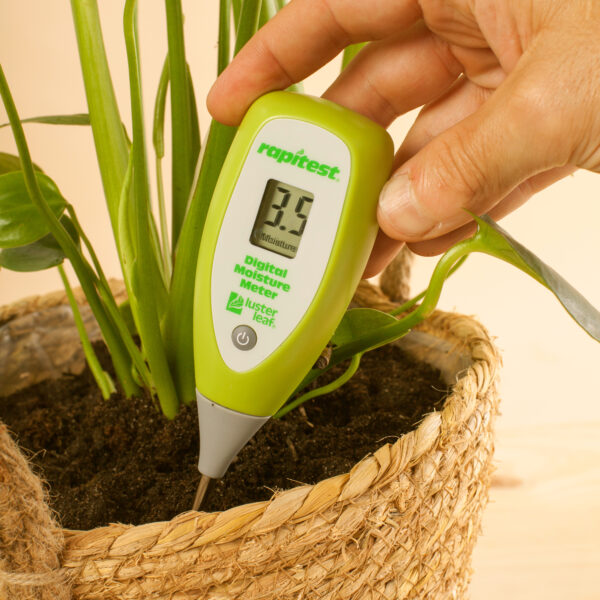Just how to Make Use Of a Moisture Meter to Find Hidden Water Damage in Your Building
Wiki Article
The Ultimate Guide to Wetness Meters: A Comprehensive Review and Just How They Can Save You Money
Dampness meters serve as vital tools in detecting and monitoring moisture web content in materials, assisting in protecting against pricey problems and ensuring the top quality of items. Comprehending the subtleties of various types of wetness meters, their applications, and the potential cost-saving advantages they provide can be a game-changer for organizations and professionals alike.Sorts Of Dampness Meters
One typical type is the pin-type dampness meter, which measures the electric resistance in between 2 pins placed into a material. Pinless dampness meters, on the various other hand, usage electro-magnetic sensor plates to scan a bigger location without triggering damage to the material's surface area.
Infrared wetness meters measure the thermal buildings of a material to identify its dampness content non-invasively, making them beneficial for applications where pin or pinless meters may not be ideal. Comprehending the various types of dampness meters offered can help markets pick the most suitable device for their particular wetness measurement requirements.

Advantages of Making Use Of Moisture Meters
Dampness meters use invaluable benefits in properly examining and checking wetness levels in varied products and atmospheres. One of the primary advantages of making use of wetness meters is the prevention of possible damages triggered by excess moisture.
In addition, making use of wetness meters can result in increased power effectiveness. By determining locations with high dampness levels, such as leakages or bad insulation, adjustments can be made to boost energy conservation and lower utility costs. In agricultural settings, dampness meters play a vital duty in enhancing plant returns by making it possible for farmers to keep an eye on dirt moisture levels and make notified irrigation choices. Overall, the benefits of making use of dampness meters cover across different industries, offering affordable remedies and promoting far better high quality control methods.
How to Pick the Right Dampness Meter
Selecting the proper moisture meter includes considering key elements such as material compatibility, measurement range, and calibration precision. When picking a wetness meter, it's important to make sure that the meter is ideal for the specific material you will certainly be screening. Different products have varying electrical buildings that can influence wetness analyses, so choosing a meter created for your product is vital for exact outcomes. In addition, think about the dimension variety of the dampness meter. Guarantee that the meter can detect moisture levels within the array required for your applications. Calibration precision is an additional vital factor to maintain in mind. look what i found Choose a moisture meter with dependable calibration to guarantee precise and constant analyses. Some meters may require regular calibration modifications, so comprehending the calibration procedure is essential. By thoroughly evaluating these aspects, you can pick a wetness meter that satisfies your demands and gives accurate moisture dimensions for your tasks.Correct Methods for Wetness Meter Use

Cost Cost Savings Through Wetness Meter Applications
Just how can the calculated utilization of moisture meters cause significant cost savings across various industries? Moisture meters play a crucial role in price savings by preventing potential damages and guaranteeing quality assurance in different sectors. In the farming market, wetness meters aid in establishing the optimum time for collecting plants, protecting against over-drying or excess moisture that can impact the end product's quality. This precise tracking aids farmers stay clear of unnecessary losses and optimize their yield.
Likewise, in construction, wetness meters aid prevent costly damages by detecting moisture degrees in structure materials, such as wood or concrete, which can lead to architectural concerns otherwise attended to without delay. By recognizing problem locations early on, professionals can take restorative actions to avoid substantial repairs or substitutes, eventually saving money and time.
Additionally, in the food processing industry, dampness meters are important for monitoring product quality and making certain conformity with safety like this regulations. By accurately determining wetness web content in food products, manufacturers can prevent wasting, preserve freshness, and reduce waste, causing considerable expense financial savings. Overall, the tactical application of wetness meters is a useful financial investment that can result in substantial cost decreases and improved effectiveness across numerous markets.
Verdict
Finally, wetness meters are important tools for gauging and detecting dampness levels in numerous materials. By using the right wetness meter and following proper strategies, individuals can effectively avoid pricey problems triggered by excess dampness. Purchasing a top quality wetness meter can lead to significant cost financial savings over time find out by recognizing prospective concerns at an early stage and enabling prompt remediation. Ultimately, dampness meters are essential instruments for preserving the stability and longevity of products and structures.Wetness meters offer as crucial devices in identifying and keeping an eye on moisture content in materials, assisting in avoiding pricey damages and making sure the top quality of items. Infrared wetness meters determine the thermal homes of a material to identify its dampness content non-invasively, making them valuable for applications where pin or pinless meters might not be appropriate.Wetness meters offer very useful advantages in properly analyzing and keeping an eye on wetness degrees in varied products and environments. In agricultural settings, moisture meters play a vital duty in maximizing plant returns by enabling farmers to keep track of soil wetness levels and make notified irrigation decisions.In final thought, wetness meters are useful devices for identifying and gauging moisture degrees in numerous products.
Report this wiki page